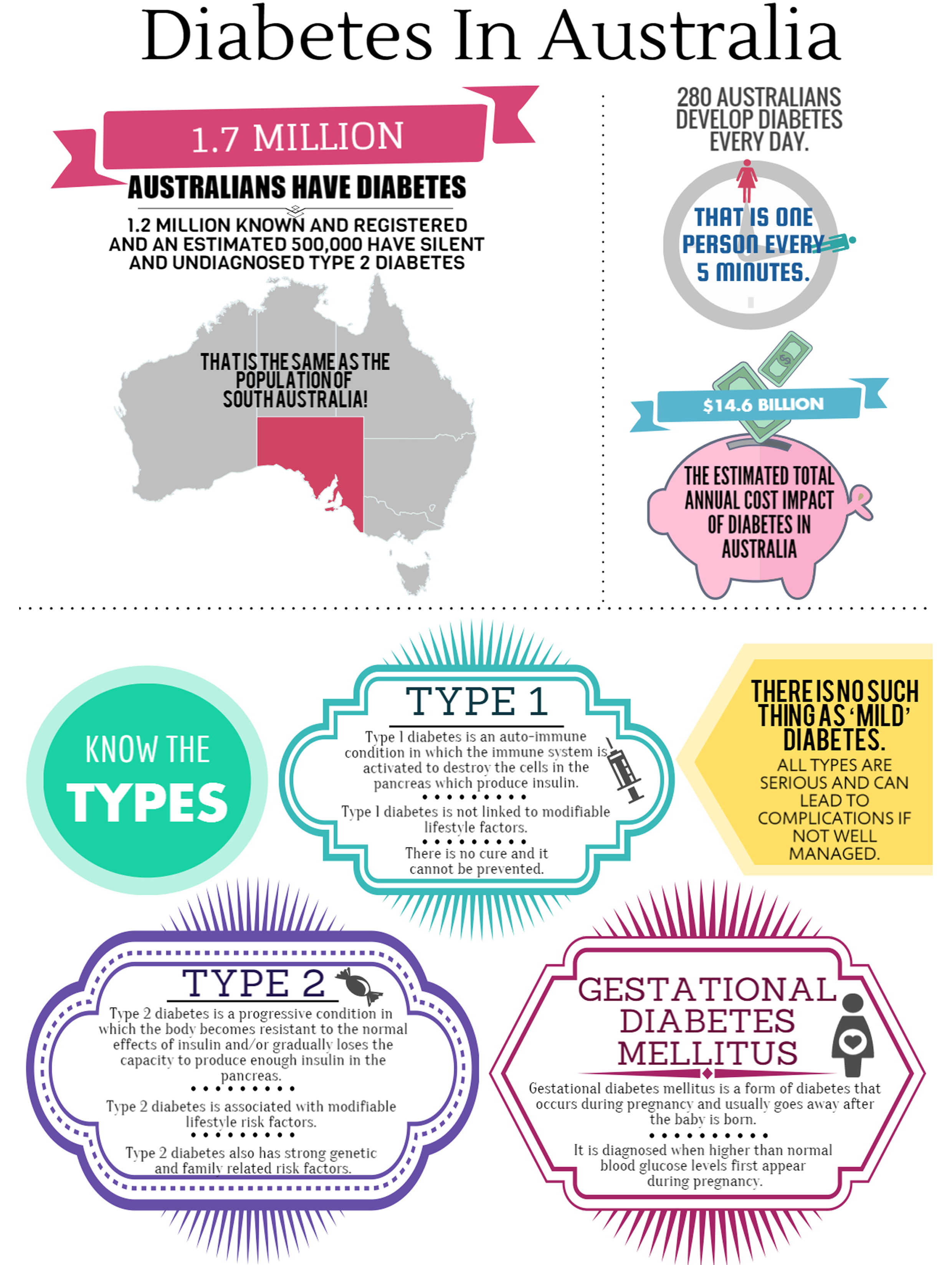Statistics from Diabetes Australia 2015
Myths & Facts – Taken Direct From Diabetes Australia
There are many myths about diabetes which may make it hard to understand. To cut through the confusion, we’ve broken down some of the common misconceptions:
Myth – Diabetes is not serious
Fact- There is no such thing as “mild” diabetes. All types of diabetes are serious and can lead to complications if not well managed. Diabetes can affect quality of life and can reduce life expectancy.
Myth – All types of diabetes are the same
Fact- There are many different types of diabetes. The main types of diabetes are type 1, type 2 and gestational diabetes. There are also other forms of diabetes but they are less common. Each type of diabetes has different causes and may be managed in different ways but once someone has diabetes, it will need to be managed every day, except gestational diabetes which goes away once the baby is born. All types of diabetes are complex and serious.
Myth – Diabetes can be prevented
Fact- Not all types of diabetes can be prevented. Type 1 is an autoimmune condition; there is no cure and no prevention. We do not know what causes type 1 diabetes.
For type 2 diabetes, it is estimated that up to 58 percent of type 2 diabetes can be prevented or delayed by exercise and healthy eating. There is no single cause of type 2 diabetes, but there are well-established risk factors. Your risk of developing diabetes is also affected by things you cannot change such as family history, where you were born or your ethnicity.
Myth – You have to be overweight or obese to develop diabetes
Fact- Being overweight or obese is one risk factor for type 2 diabetes, it is not a direct cause. Some people who are overweight may not develop type 2 diabetes while some people who are of a healthy weight will develop type 2 diabetes.
Type 1 diabetes is not preventable and not associated with lifestyle factors.
Myth – You only get type 1 diabetes when you’re young
Fact- Type 1 diabetes can occur at any age but it often occurs in children and young adults.
Myth – You only get type 2 diabetes when you’re old
Fact- Type 2 diabetes usually develops in adults over the age of 45 years but is increasingly occurring in younger age groups including children, adolescents and young adults.
Myth – People with diabetes can’t eat dessert
Fact- Because diabetes is a condition where your blood glucose level is too high, many people think they need to avoid sugars and foods containing sugar. However, if eaten as part of a healthy meal plan, or combined with exercise, sweets and desserts can be eaten by people with diabetes. The key is to eat everything in moderation.
The Australian Dietary Guidelines are recommended for people with all types of diabetes as well as the rest of the population. For your individual dietary needs, we recommend seeing an Accredited Practicing Dietitian and talking to you diabetes healthcare team about the right approach to help you live well with your diabetes.
Myth – People with type 1 diabetes can’t participate in sports or exercise
Fact- Many Australian sport champions have type 1 diabetes. Read our profile on AFL Essendon Football Player Jack Fitzpatrick.
Myth – No one in my family has diabetes so I don’t have to worry
Fact- Family history is only one of the risk factors for type 2 diabetes.
Myth – People with diabetes are unsafe drivers
Fact- the vast majority of drivers who use insulin can safely drive, learn more.
Myth – Only people with type 1 diabetes need insulin
Fact- Type 2 diabetes is a progressive condition. 50 percent of people with type 2 diabetes will need insulin after 6-10 years of being diagnosed with diabetes because the pancreas produces less insulin over time. Taking medication when required can result in fewer complications in the long-term and is part of managing type 2 diabetes.
People with type 1 diabetes depend on insulin replacements every day of their lives. They must test their blood glucose levels several times throughout the day.
By Alex Hills
Alex has been a qualified naturopath and in the natural medicine field for over a decade. During this time has had the opportunity to experience almost every aspect of the industry. She has been in clinical practice, vitamins manager at a pharmacy, marketing coordinator for an organic skin care company as well as training other practitioner in an area manager role.
Alex now works full time at Research Nutrition’s Brisbane head office as the Sales and Marketing Coordinator to satisfy her inner tech-nerd and passion for educating both customers and patients in a fun and informative way!








Leave a Reply
Want to join the discussion?Feel free to contribute!